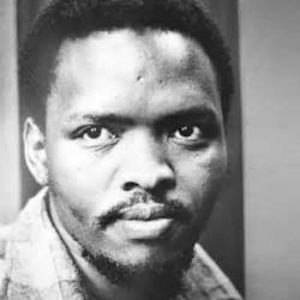
Stephen Biko
*Stephen Biko was born on this date in 1946. He was a Black South African anti-apartheid activist, African nationalist, and African socialist.
Bantu Stephen Biko was born at his grandmother's house in Tarkastad, Eastern Cape, South Africa. The third child of Mzingaye Mathew Biko and Alice 'Mamcete' Biko, he had an older sister, Bukelwa, an older brother, Khaya, and a younger sister, Nobandile. His parents had married in Whittlesea, where his father worked as a police officer. Mzingaye was transferred to Queenstown, Port Elizabeth, Fort Cox, and finally, King William's Town, where he and Alice settled in Ginsberg township. This settlement comprised around 800 families, with every four sharing a water supply and toilet.
Bantu African and Coloured people lived in the township, where Xhosa, Afrikaans, and English were spoken. After resigning from the police force, Mzingaye worked as a clerk in the King William's Town Native Affairs Office while studying for a law degree by correspondence from the University of South Africa. Alice was employed first in domestic work for local white households, then as a cook at Grey Hospital in King William's Town. Raised in a poor Xhosa family, Biko grew up in Ginsberg township in the Eastern Cape. According to his sister, observing his mother's demanding working conditions resulted in Biko's earliest politicization.
In 1966, he began studying medicine at the University of Natal and joined the National Union of South African Students (NUSAS). Vehemently opposed to the apartheid system of racial segregation and white-minority rule in South Africa, Biko was frustrated that NUSAS and other anti-apartheid groups were dominated by white liberals rather than the blacks most affected by apartheid. He believed that well-intentioned white liberals failed to comprehend the Black experience and often acted paternalistically. He believed that to avoid white domination, Black people had to organize independently. To this end, he became a leading figure in creating the South African Students Organization (SASO) in 1968.
Membership was open only to "blacks," a term Biko used to reference Bantu-speaking Africans, Coloureds, and Indians. He was careful to keep his movement independent of white liberals but opposed anti-white racism and had white friends and lovers. During this time, he had a relationship with Mamphela Ramphele. The couple had two children. The white-minority National Party government was initially supportive, seeing SASO's creation as a victory for apartheid's ethos of racial separatism. He was at the forefront of a grassroots anti-apartheid campaign’s Black Consciousness Movement during the late 1960s and 1970s. His ideas were articulated in articles published under the pseudonym Frank Talk.
Influenced by the Martinican philosopher Frantz Fanon and the American Black Power movement, Biko and his compatriots developed Black Consciousness as SASO's official ideology. The movement campaigned to end apartheid and the transition of South Africa toward universal suffrage and a socialist economy. It organized Black Community Programs (BCPs) and focused on the psychological empowerment of Black people. Biko believed that Black people needed to rid themselves of any sense of racial inferiority, an idea he expressed by popularizing the slogan "Black is Beautiful."
In 1972, he founded the Black People's Convention (BPC) to promote Black Consciousness ideas among the wider population. The government came to see Biko as a subversive threat and placed him under a banning order in 1973, severely restricting his activities. He remained politically active, helping organize BCPs such as a healthcare center and a crèche in the Ginsberg area. During his ban, he received repeated anonymous threats and was detained by state security services several times.
Following his arrest in August 1977, state security officers beat Biko to death on September 12, 1977. Over 20,000 people attended his funeral. His political legacy remains a matter of contention, and Biko's fame spread posthumously. He became the subject of numerous songs and works of art, while a 1978 biography by his friend Donald Woods formed the basis for the 1987 film Cry Freedom. During Biko's life, the government alleged that he hated whites, various anti-apartheid activists accused him of sexism, and African racial nationalists criticized his united front with Colored and Indians. Nonetheless, Biko became one of the earliest icons of the movement against apartheid and is regarded as a political martyr and the "Father of Black Consciousness."
Truth and Reconciliation Commission of South Africa report,
Copyright McMillan,
March 1999.